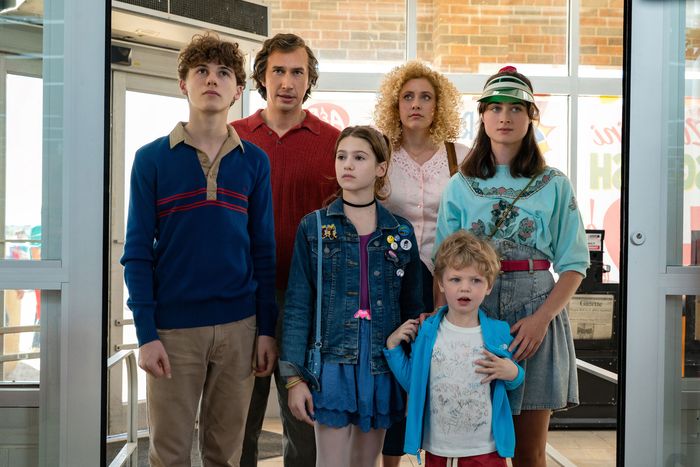
We like to talk about “festival brain” — that hallowed giddiness that can lead to critics overhyping the movies they see at festivals. But there’s a related, opposite reaction that can also occur. Let’s call it “festival meh.” Especially at big festivals, so much time and energy is put into anticipating certain movies that when the result is thoroughly, unclassifiably weird, nobody knows what to do with it.
Noah Baumbach’s White Noise premiered at Venice last night, and it strikes me as potentially such a movie: too bizarre to be appreciated by those waiting for a big, star-studded festival oomph, not quite arty enough to attract those looking for an under-the-radar discovery. And yet too damned entertaining to be dismissed as a bust. Critics have so far been mostly kind, but a lot of the buzz I heard about the film yesterday on the ground at Venice was mixed, and apparently even the obligatory post-premiere standing ovation was “muted.”
None of this should actually surprise anyone. Don DeLillo’s award-winning 1985 novel about consumerism, media, celebrity, toxic clouds, health scares, and our fascination with death has always felt like it takes place in a world just one degree removed from ours. Several filmmakers have tried to adapt it over the years, and even more have deemed it (like much of the author’s work) “unfilmable.” There’s a reason they say that. Because it sort of is.
But watching Noah Baumbach’s White Noise, which will come out on Netflix later this year, one senses that our world has finally caught up to DeLillo’s. At its most basic, it’s the story of a small college town rocked with panic when a train derailment unleashes a menacing and dangerous chemical into the skies. (We owe to DeLillo the enduring popularity of the poetic phrase “airborne toxic event.”) Scenes of a precocious family trying to navigate their way through a terrifying public-health scare — complete with various characters doing their own research — perhaps have a more universal kick nowadays. As too does the chosen field of study of the protagonist, Jack Gladney (Adam Driver): He is America’s foremost professor in the field of Hitler Studies, and one listens to him ruminate on the fear of death that drove Germans into the arms of a bloviating strongman with an unnerving recognition.
These contemporary echoes really are striking, especially given how faithful Baumbach manages to be to DeLillo’s original, cramming as much of the book’s dense detail and offhand observations as he can into the film’s two-hour-plus running time. Most of the dialogue in the movie comes verbatim from the novel. That makes for an interesting challenge, since DeLillo’s dialogue is so delightfully odd and ornate, with repetitive, rat-tat-tat back-and-forths that feel like human interactions rewritten by a highly perceptive space alien. But Driver and Greta Gerwig (as Jack’s health-obsessed, angst-ridden, important-haired wife Babette) make DeLillo’s cadences their own. They play the dialogue as a kind of verbose comedy, and it’s quite hilarious.
This style of delivery is not foreign to these actors; in shape, it’s not all that different from a lot of the micro-budget indies from earlier this century where Driver and Gerwig got their start. But the reflectively cutting nature of the dialogue is new, the way it serves to skewer the viewer/listener/reader even more than it does the speaker. As characters discuss whether to call the toxic event “a feathery plume” or “a black, billowing cloud,” DeLillo’s portrayal of how we can become so easily obsessed with the vernacular of apocalypse feels like a perfect distillation of the past couple of years.
Of course, Baumbach can’t replicate the author’s angelic prose, that hyperintelligent, totalizing voice that is one of the great forces of late-20th-century American fiction. He hasn’t quite pulled off what Paul Thomas Anderson did with his Thomas Pynchon adaptation Inherent Vice, where the prose became a kind of otherworldly narration, half-removed from the film like a hazy memory. That movie too was a surprisingly faithful adaptation of a notoriously unfilmable author, but at least Pynchon’s original was already a riff on the highly cinematic noir genre.
Baumbach does something else here, however, and it’s quite fascinating (and effective at times). He turns White Noise into a pastiche of 1980s Spielbergian action fantasy, with its downright nostalgic portrait of a small-town disaster. (There’s even a playfully crescendoing Danny Elfman score.) After all, the author is obsessed with the idea of spectacle, so why not turn his most beloved work into an actual spectacle? Why not turn it into a popular movie that might have been playing in theaters when the book came out? So, a brief couple of lines from the book about a gas-station stop turns into a big suspense sequence. The Gladney family’s automotive exodus in the wake of the toxic cloud becomes a goofy, grandiose car chase. Baumbach also has fun with some of the novel’s more notable set pieces, such as a duet-battle of competing lectures on Hitler and Elvis, performed brilliantly by Driver and Don Cheadle.
White Noise is certainly uneven — wildly so, probably by design — but it’s also never boring, always eager to throw something new at the viewer, and it’s eager to entertain. I never imagined I’d laugh so hard while watching a movie adaptation of Don DeLillo’s White Noise. Baumbach has clearly connected with a latent cinematic quality in the author’s work. But his reverence can be a double-edged sword. Which is why the film will probably always be known as “the movie adaptation of Don DeLillo’s White Noise” and not just “White Noise.”


